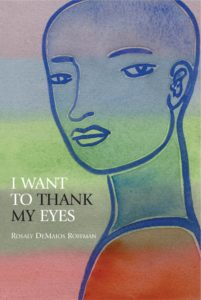 Review by Nancy Vona
Review by Nancy Vona
– I experienced a serious case of writer envy after reading Rosaly DeMaios Roffman’s latest book of poetry. Many of the poems evoked an exclamation of “that’s how I feel—I wish I’d written that!” Roffman has a beautiful, strong voice that transforms ordinary events in wise, elegiac utterances.
The author of several books of poetry, Roffman taught creative writing, myth and literature and founded a Center for the Study of Myth and Folklore at Indiana University of Pennsylvania. Her poems have been translated into Slovak, Spanish, Japanese, and Chinese, and she has contributed text or poems for twenty collaborative pieces with composers and dance companies.
Roffman also coordinates the Squirrel Hill Poetry Workshop, a writing group founded thirty years ago, that meets in Pittsburgh. A quote on the workshop’s website by Samuel Johnson –“The two most engaging powers of an author are to make new things familiar, and familiar things new”–captures the essence of Roffman’s poetry. I appreciated the celebration of the ordinary in this volume that is thoughtful but never somber.
Divided into four sections, these heartfelt, honest poems are filled with gratitude toward the universe. There’s also plenty for the analytical mind to savor as well, for many of the poems allude to mythology, artwork, literature, and writers. The poetry covers a range of occurrences and topics—a Buddha being vandalized on a porch, travels in Scotland, a ballad to a former love, even poems of gratitude to Roffman’s eyes and feet.
In one poem, she observes a child washing a nun doll at a cookout and imagines washing the bodies of the wisest and holiest among us:
Who will do the real thing; wash Mother Teresa,
wash Desmond Tutu, wash Elie Wiesel
…I watch
this girl with a cup of water—washing
as her mother did—toes and fingers
What can any of us do for them,
those holy among us, but rub their feet,
wash their faces, hope paint doesn’t fade
put clean clothes back on their sacred bodies
white perhaps, and hold them in our arms…
–“Washing the Nun Doll”
Haven’t we all lived this type of moment? Where we are at an ordinary event and suddenly experienced a flash of grace and wisdom?
While Roffman sometimes employs couplets or stanzas of three lines, she more frequently uses free verse as her canvas. Her writing is rich with simile and metaphor. I savored the most direct similes:
In a leftover dream
my soul is rising,
like the humps in the Aegean
— “Tottering Palaces”
Or metaphors:
it’s not your children’s short shoes
malnutrition or old poverty
that makes feet in middle age turn East and West
it’s bones telling stories of the great birds we were…
–“My Feet Become the Wings of a Bird I’ve Never Seen”
Bones telling stories of the great birds we were. What an amazing line!
The poems are both narrative and lyrical. The ordinary is sacred, present moments nuanced with memory, in Roffman’s confident utterances. In the title poem, she thanks her eyes for what they have allowed her to see:
You were brilliant
in Jerusalem when you took in
Manger Street and then in Dachau
through an opening in a cave
you found me one unexpected flower
since I was foolish and came empty-handed
to the endless graves of children
–“I Want to Thank My Eyes”
In the poem, she celebrates not only what she has seen, but also the imperfection of her eyes as well.
Roffman’s poetry is not only finely written, it is also advice for how to live our lives. For me, a mother re-entering the world of reading and writing poetry, I will return to this volume of poetry again and again, to nurture the soul and to nourish a spirit of gratitude.
I Want to Thank My Eyes by Rosaly DeMaios Roffman
Tebot Bach Press http://www.tebotbach.org
Huntington Beach, CA; May 2012
Nancy Vona’s work has been published in Rushlight, Literary Mama, and The Mom Egg. She finds time to write whenever she can climb out of the sinkhole of elementary school volunteer activities. She lives with her husband, two sons, and dog in Massachusetts.
